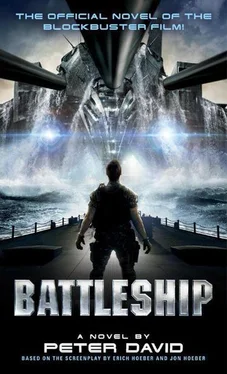Peter David - Battleship
Здесь есть возможность читать онлайн «Peter David - Battleship» весь текст электронной книги совершенно бесплатно (целиком полную версию без сокращений). В некоторых случаях можно слушать аудио, скачать через торрент в формате fb2 и присутствует краткое содержание. Город: New York, Год выпуска: 2012, ISBN: 2012, Издательство: Del Rey, Жанр: Боевая фантастика, на английском языке. Описание произведения, (предисловие) а так же отзывы посетителей доступны на портале библиотеки ЛибКат.
- Название:Battleship
- Автор:
- Издательство:Del Rey
- Жанр:
- Год:2012
- Город:New York
- ISBN:978-0-345-53538-2
- Рейтинг книги:4 / 5. Голосов: 1
-
Избранное:Добавить в избранное
- Отзывы:
-
Ваша оценка:
- 80
- 1
- 2
- 3
- 4
- 5
Battleship: краткое содержание, описание и аннотация
Предлагаем к чтению аннотацию, описание, краткое содержание или предисловие (зависит от того, что написал сам автор книги «Battleship»). Если вы не нашли необходимую информацию о книге — напишите в комментариях, мы постараемся отыскать её.
Battleship — читать онлайн бесплатно полную книгу (весь текст) целиком
Ниже представлен текст книги, разбитый по страницам. Система сохранения места последней прочитанной страницы, позволяет с удобством читать онлайн бесплатно книгу «Battleship», без необходимости каждый раз заново искать на чём Вы остановились. Поставьте закладку, и сможете в любой момент перейти на страницу, на которой закончили чтение.
Интервал:
Закладка:
When Beacon had been offered him two months later, it had been a godsend. However the prospect of relocating to the Himalayas, of all places, had been less than attractive.
And the Greater Himalayas, just to make it worse. At least there were some sections of the Himalayas that were livable. The Shilawik Hills, for instance, were supposed to be quite nice. The Midlands were said to have over sixty species of rhododendrons alone in the subalpine conifer forests.
But the Greater Himalayas were… well, they were exactly what one pictured when one heard the name “Himalayas.” Mountain ranges nearly three miles high, cloaked in an endless blanket of ice and snow. The facility itself was buried—almost literally—in Tibet, and the howling of the wind never stopped so much as it sometimes grew and sometimes diminished. On occasion the sunlight filtered through, but routinely they would go for days shrouded in darkness, like an entire facility of people who were slowly going blind.
And yes, Nogrady understood the need to operate under the radar. He understood the desire for secrecy. The funding for this endeavor was coming through governments working with private sources, and that was always a touchy subject because nosy politicians would then start demanding investigations and wanting to know what were the sources’ motivations.
When Nogrady had finally made the trek up to the site, what he saw on the outside didn’t seem especially promising. In fact, it looked downright unprepossessing. Short and squat, two stories tall, fashioned of white brick, with antennae arrays and satellite dishes on the roof and massive generators next to it. There was already a layer of permafrost on the building and Nogrady was concerned that within two weeks he’d go stir-crazy.
That hadn’t been the case, as it turned out. Instead he had found a dedicated group of scientists who were familiar with Nogrady’s work and were thrilled to have him on board as the project director. What he hadn’t accounted for in his initial trepidation was that this sort of environment tended to cause people to bond in a way that wasn’t possible under less claustrophobic circumstances. The team had quickly formed a smooth, cohesive unit as they had worked together to develop and fine-tune the equipment necessary to accomplishing their collective goal.
Most intriguingly, they had been doing so in tandem with several other locations. Nogrady had never been to them, but he had seen pictures of the cinder-block building in Morocco, isolated in the Sahara—hidden in plain sight, as it were—and a third on a mountaintop in Hawaii. The respective staffs had shared information, engaged in lengthy intercontinental brainstorming sessions, and ultimately come up with designs and equipment together that no individual group could have developed fully.
And when they hadn’t been working, there had been plenty of late-night parties to blow off steam. Curiously, some of the best ideas had resulted from those gatherings, as idle talk and occasionally drunken inspiration had sent the group sprinting back to the lab to try implementing them.
Now, finally, all of that had come to a head. Approaching the moment with what seemed appropriate pomp and circumstance, Nogrady had arranged a full-blown ribbon-cutting ceremony. His colleagues had suspended a long, red ribbon across the middle of their now state-of-the-art facility and Nogrady had sliced through it with a replica samurai sword he’d borrowed from Doctor Okuda. This had been met with a burst of cheers, followed by the scientists settling down to work. There was growing excitement in the air for this moment toward which they had been building for two years.
“Synch with Morocco and Oahu,” Nogrady said briskly. He was trying to keep his voice flat and even. He needed to remain professional, and chortling with unconcealed delight would certainly not be in keeping with his desired demeanor.
“Synched,” said Carlson, a young technician who was so fresh out of grad school that sometimes he was jokingly referred to as still having that “new scientist smell.”
There had been a constant buzz of motion and activity, but all that somehow quieted to a hush when Carlson said that. Everyone stopped in anticipation of Nogrady’s next words.
He tried to think of something that wouldn’t sound too pretentious and he failed utterly. “People… get ready to make history.”
Doctor Calvin Zapata rolled his eyes when Nogrady spoke about making history. Zapata thought that Nogrady was brilliant, but—even for a scientist—he could be kind of a dork on occasion. This was one of those occasions.
Not to mention the fact that Zapata had his own issues with what they were doing there that he had to deal with. Issues that he wasn’t hesitating to voice to one of his coworkers, Rachel Dorn. It didn’t hurt, of course, that Rachel was also the best-looking woman in the place: several years younger than Zapata, with thick red hair, a charming array of freckles across her nose that had faded during her time there (but were still slightly visible), and horn-rimmed glasses that were perpetually perched on the edge of that same nose.
He was seated next to Dorn, both of them on rolling chairs, studying the readouts to make sure that—as the energy levels increased—the climb was slow and steady and didn’t spike. In a low voice he muttered, in regards to Nogrady’s pronouncement, “I think that’s what Napoleon said right before Waterloo.”
She shook her head. “Cal…” she said scoldingly, knowing what was coming next.
She was absolutely right. Zapata was on a roll, and faint recriminations from Dorn weren’t about to stop him. “Everyone here still believes that if there’s life out there, it’s kind and good and all that Kumbaya crap.”
Dorn had been keeping her attention fully on the monitoring devices in front of her, but she risked a sidelong glance at Zapata. “Your conspiracy disorder is activating again.”
He rolled in closer to her under the guise of wanting to speak confidentially. In point of fact, he just liked being near her. She smelled incredible. He had no idea how the hell she was getting a supply of whatever that scent she wore was, considering they were in the middle of nowhere. It took him a moment to get focused back on what he’d just been talking about, but he managed. “We need to worry about what happens after we get a response, because believe me, it’s not gonna be—”
“All Kumbaya? Cal, do you even know what ‘Kumbaya’ means?”
He paused, looking confused. “It means everybody gets along and toasts marshmallows around a campfire and stuff. Doesn’t it?”
“It means ‘come by here.’ It’s asking for God to come by and smile on his creations. And if there is a God,” she added, smiling, “then he created whatever’s out there, and maybe he’d like us all to meet and hold hands.”
If she hadn’t been so charming, Zapata would have been appalled by her naïveté. “If there really is intelligent life out there and they ‘come by here,’” he said sourly, “it’ll be like Columbus and the Indians. Only we’re the Indians.”
“Most of the time he traded peacefully with the Indians, except for one time in the Dominican Republic when the Indians attacked and drove him away. So what’s your point?”
He stared at her. “You’re just a fount of information today, aren’t ’cha.”
“Look, Cal,” she said patiently, “if you don’t believe in the mission, why are you here?”
It wasn’t an unreasonable question. “J. Robert Oppenheimer never believed in using atomic weapons. But he’s the guy who built the bomb. The Manhattan Project was where the smartest guys in the world were. And the smartest women, too,” and he winked at her.
Читать дальшеИнтервал:
Закладка:
Похожие книги на «Battleship»
Представляем Вашему вниманию похожие книги на «Battleship» списком для выбора. Мы отобрали схожую по названию и смыслу литературу в надежде предоставить читателям больше вариантов отыскать новые, интересные, ещё непрочитанные произведения.
Обсуждение, отзывы о книге «Battleship» и просто собственные мнения читателей. Оставьте ваши комментарии, напишите, что Вы думаете о произведении, его смысле или главных героях. Укажите что конкретно понравилось, а что нет, и почему Вы так считаете.












